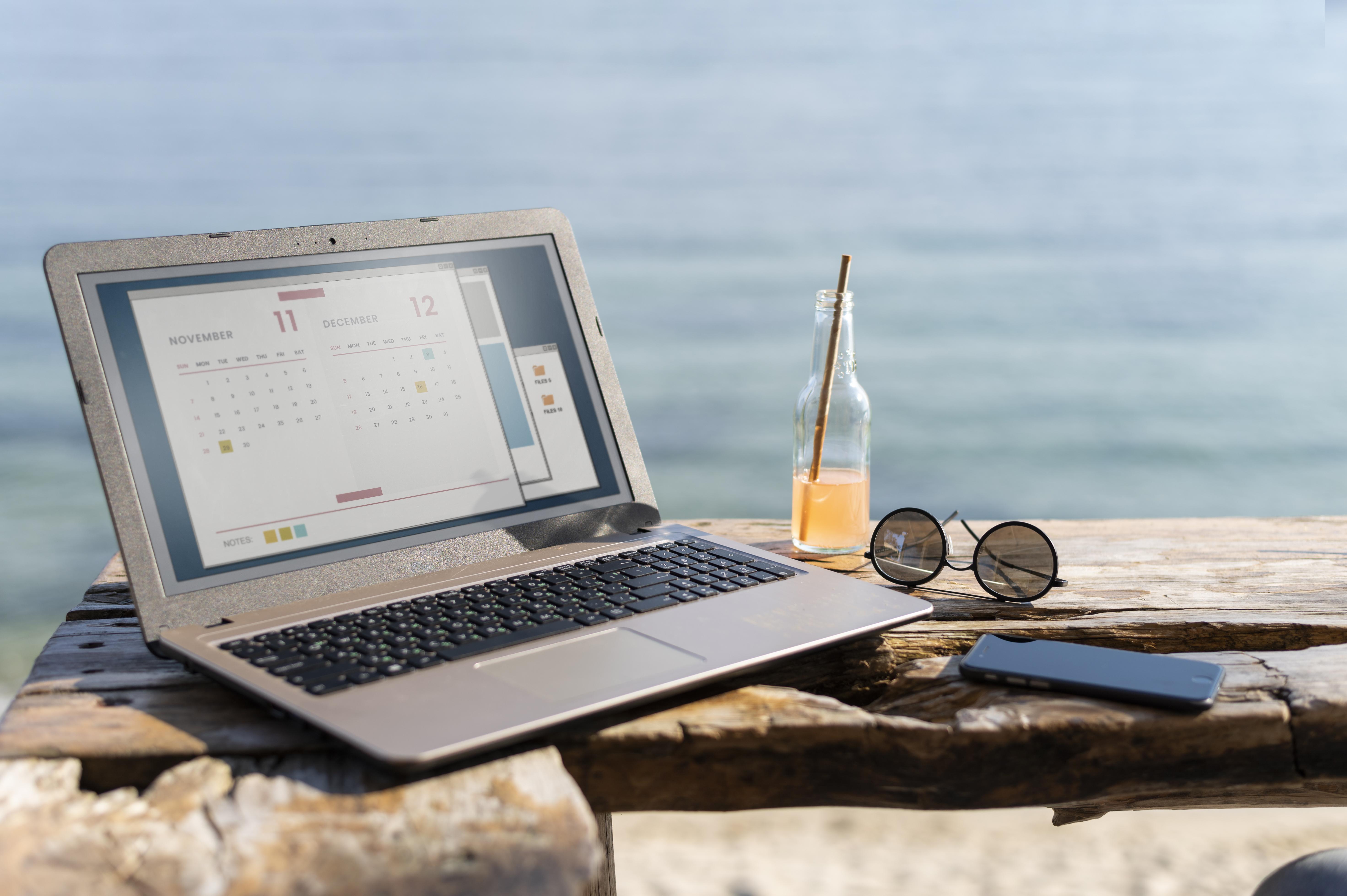Back in the day, it was a boss’s privilege.
Vacations were vacations. And work was work. The lines didn’t blur. Parents sometimes headed back to the office early, leaving their children to enjoy the summer right through to the end.
And then came the internet. Then smartphones. Suddenly, white-collar workers were reading emails on the beach, climbing on stools in rental homes to find a signal strong enough to download a file, or taking serious work calls in the middle of a hike.
Most of them didn’t love it. Taking a vacation should be about unplugging! And let’s be honest—wasn’t that start-upper cousin by the pool who kept talking about inbounding, leveraging, and scaling a tad unbearable? Just because he couldn’t switch off, why should the rest of us spend our time thinking about work instead of enjoying ice cream, lazy days, or a bit of snorkeling? It’s almost as if he could only enjoy his vacation if he could prove how desperately they needed him at the office.
Because yes, there certainly was a time when a “workation”—that mash-up of “work” and “vacation”—was only for high-powered execs. The ones whose office couldn’t function without them for three weeks. The ones whose work was basically their life.
The pandemic changed the game
Spring 2020 turned everything upside down. Remote work became the norm, but not all home offices looked the same. Some people were crammed into kitchen corners in tiny apartments surrounded by stir-crazy children. Others worked from their second homes in the countryside, jumping on video calls to the melodies of birdsong and taking a dip in their pool on their lunch break. For those lucky enough to escape the city, it was a game changer. Why go back to the confines of a city office when you can work just as well from your garden?
That shift changed the way we saw things the following summer, and the ones thereafter. Instead of rushing home to get ready for school in mid-August, people began staying put and working from their vacation spots. Sunscreen and spreadsheets under the pergola, fresh salads and PowerPoint decks by the pool, sun hats and Teams meetings in flip-flops.
It was funny to think that just a year earlier, managers believed that “working from home” was code for “slacking off”. They clung to the cult of presenteeism and the sanctification of professional suffering. But if people were coming up with the goods, who cared if they were doing it poolside?
The other side of the workation
There’s the idyllic version: a gorgeous setting, high productivity. But there is also the more pessimistic version of blurring pushed to excess. When the line between work and home is completely erased.
Some people don’t mind: they love what they do and if they can do it in a beautiful place, why stop? But we need to remember that we’re still human. And humans have a vital need for mental rest. So, however captivated you might be by your work, you also need proper time off to get some soothing sleep and keep your metabolism working properly.
Other people aren’t fans of workations. For them, vacations are for doing new things, seeing new sights, and spending quality time with family. These are often the same people who breathe a huge sigh of relief when the children go back to school and they can enjoy a quiet lunch in the company canteen, instead of having to cook twice a day. There is a time for everything. And for them, blending work and vacation means doing neither very well.
And then there are those caught in the crossfire, dragged into someone else’s workation. Your boss is on a remote island but has full 5G reception, so expect a call around 6 p.m. Whoops! You are on a real vacation and they forgot! Your colleague is on a workation in another zone with an 8-hour time difference. So the video call has to happen between 9 a.m. and 11 a.m., no later. And wouldn’t it be better to do the brainstorming session in person? Sure, that would be great, but John is joining us from his garden, Sophie’s calling in from her mountain reno, and Julie is working from home; she’s just four metro stops away, but since it’s a hybrid meeting, she thought she’d just jump on the call…
Revealing inequalities
Workations shine a harsh spotlight on inequalities, widely reported since the Covid crisis. First of all, we know that not everyone has a job that can be done remotely. Apparently working from home is possible for 30% of jobs, though a Boostrs study estimated that number could be as high as 62%. The divide is stark: over 80% of managers work remotely, compared to less than 20% of employees. So only the wealthy can choose to take—and enjoy—a workation.
That brings us to the socioeconomic angle. Jetting off for a month or two to spend part of the time relaxing and the other part working isn’t something everyone can afford. Let’s not forget that 40% of French people, 44% of Americans, 75% of Mexicans and 33% of Chinese people don’t take vacations at all. Watching others “workation” in luxury can be a brutal reminder of income gaps.
There is also the question of gender. When men work from home, they don’t necessarily pick up more of the domestic load. Worse, it appears that even when men pitch in a little more, women end up doing a lot more. Remote work often becomes a double shift! And if one partner is on a workation while the other is on vacation, guess who ends up handling all the chores? Hint: it’s not the one glued to their laptop.
Is it time to flip the script?
Workations are great for some people. But not for others. OK, fine. One question remains, however: have we got the balance right between a holiday mood and a work mindset, or is one steamrollering the other?
To answer this question honestly, take a look at what journalist Guillemette Faure has to say about bringing your holiday to your workplace. Can you picture yourself strolling into your open-plan office in a sarong, just as you would go to open your laptop on vacation? What about playing a board game with your coworkers in the middle of the day, just as you’d take work calls from a beach bar? Curling up with a book on the lobby couch as you would sneak a check-in with your boss on the road between museums? If your answer is no to any of the above, then maybe workations are really just work invading your downtime. But that’s fine, right? Sure, on the condition that you look after your health (which includes getting proper rest) and respect everyone else’s work-life balance.
Marie Donzel, for the EVE web magazine






